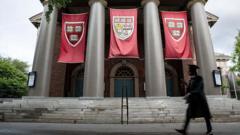Amid escalating tensions with Harvard University, the Trump administration plans to review federal grants worth $100 million sent to the institution. This move has sparked protests among students and criticism from academia, highlighting the deepening rift between the university and the government.
Trump Administration Considers $100 Million Funding Cuts to Harvard University

Trump Administration Considers $100 Million Funding Cuts to Harvard University
The White House is initiating a review of federal grants to Harvard University, estimating potential cuts to approximately 30 contracts worth $100 million, citing concerns over discrimination and antisemitism.
Harvard University is currently facing scrutiny from the Trump administration, which is considering the withdrawal or reallocation of approximately $100 million in federal funding. The Government Services Administration (GSA) has been tasked with reviewing federal contracts with Harvard, as tensions rise between the White House and the institution.
A senior White House official confirmed that a letter would be circulated to federal agencies urging them to examine whether contracts with Harvard could be "cancelled or redirected." This review includes about 30 federal grants, following the administration's precedent of freezing $2.65 billion in funding and earlier attempts to revoke the university's tax-exempt status and restrict international student enrollment.
Harvard University has been silent on the recent developments, though on its official website, it emphasizes that its significant contributions to medical and scientific research rely on federal funding. The university articulates concerns that losing federal support would halt critical research efforts midstream, particularly in areas like cancer and infectious diseases.
The review initiated by the White House will not automatically terminate funding but aims to assess which funds are deemed essential. As part of this assessment, the GSA will suggest agencies terminate contracts that do not meet certain standards. A draft letter from the administration accuses Harvard of antisemitism and discrimination, a claim that has sparked backlash from student and faculty groups who argue that the justification for potential cuts is unfounded.
Notably, if the review finds particular grants to be vital, agencies might argue for their retention. Harvard is experiencing amplified scrutiny due to previous actions by the administration, such as freezing significant funding and launching legal challenges over international student policies.
On the academic front, departments such as the Sinclair Lab at Harvard Medical School, which seeks to explore aging and associated diseases, have been adversely affected by funding freezes, resulting in job losses and disrupted research. Scholars assert that these cuts not only cripple ongoing research initiatives but jeopardize collaborations with international scholars—who bring essential expertise and resources.
Harvard's president, Alan Garber, emphasized the broader implications of cutting research funding and cautioned that such actions ultimately hurt not just the university but the entire nation. Former students and academic professionals voiced concerns about the long-term consequences that funding cuts could have on graduate students and researchers who depend on external grants.
A senior White House official confirmed that a letter would be circulated to federal agencies urging them to examine whether contracts with Harvard could be "cancelled or redirected." This review includes about 30 federal grants, following the administration's precedent of freezing $2.65 billion in funding and earlier attempts to revoke the university's tax-exempt status and restrict international student enrollment.
Harvard University has been silent on the recent developments, though on its official website, it emphasizes that its significant contributions to medical and scientific research rely on federal funding. The university articulates concerns that losing federal support would halt critical research efforts midstream, particularly in areas like cancer and infectious diseases.
The review initiated by the White House will not automatically terminate funding but aims to assess which funds are deemed essential. As part of this assessment, the GSA will suggest agencies terminate contracts that do not meet certain standards. A draft letter from the administration accuses Harvard of antisemitism and discrimination, a claim that has sparked backlash from student and faculty groups who argue that the justification for potential cuts is unfounded.
Notably, if the review finds particular grants to be vital, agencies might argue for their retention. Harvard is experiencing amplified scrutiny due to previous actions by the administration, such as freezing significant funding and launching legal challenges over international student policies.
On the academic front, departments such as the Sinclair Lab at Harvard Medical School, which seeks to explore aging and associated diseases, have been adversely affected by funding freezes, resulting in job losses and disrupted research. Scholars assert that these cuts not only cripple ongoing research initiatives but jeopardize collaborations with international scholars—who bring essential expertise and resources.
Harvard's president, Alan Garber, emphasized the broader implications of cutting research funding and cautioned that such actions ultimately hurt not just the university but the entire nation. Former students and academic professionals voiced concerns about the long-term consequences that funding cuts could have on graduate students and researchers who depend on external grants.





















